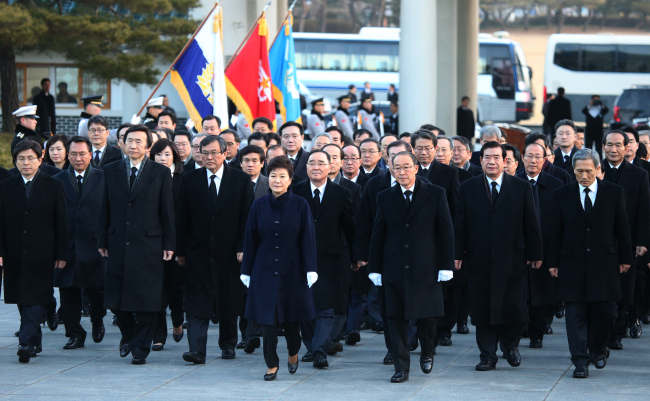
President Park Geun-hye began the new year reiterating her economic and social targets and calling on the nation to come together, but the outlook for the political arena appears anything but harmonious.
“My administration will channel the national capabilities into reinforcing the hard-won gains of economic recovery, so as to invigorate the economy and stabilize the day-to-day lives of the people,” Park said in her New Year speech, calling on the public to “join forces to prepare for an economic takeoff.” She added that her government will lay the foundations for peaceful reunification of the two Koreas on top of an “impregnable security posture.”
“As we open a new year and embrace new changes, I ask all of you to join us. My administration will do everything it can to ensure 2014 brings greater hope and vitality to you all.”
However the political parties, whose cooperation will be crucial to Park achieving her goals, are to be wrapped up in crucial elections in June and July which will be key barometers for the Park Geun-hye administration.
Voters will pick provincial and municipal chiefs and councilors in June in nationwide local elections. As many as 10 parliament seats will be contested during by-elections the following month.
“The year is all about the elections. If you consider candidate nominations, the elections start in January, and from March, the election-dominated environment will take hold,” professor Shin Yul of Myongji University said.
The effects of the upcoming elections began to take hold within the ruling Saenuri Party in December. With its chairman Rep. Hwang Woo-yea’s term ending in May, calls to elect the new leadership in March clashed with the plan to hold the in-house election in August, after both elections.
The call for a March election is supported by the pro-Lee Myung-bak faction, and is considered by some a ploy to undermine the pro-Park Geun-hye faction’s position in the party.
The biggest challenge for the ruling party, and the main opposition Democratic Party, however, will come from independent Rep. Ahn Cheol-soo.
Ahn has been laying the foundation to launch his own party for some time, and appears to pose a threat the two behemoth parties have not faced in recent years. While Ahn allied with the DP’s Rep. Moon Jae-in last year’s presidential election, both sides have ruled out a similar alliance in this year’s elections.
According to a survey conducted by Gallup Korea in the final week of November, Ahn’s party could receive the support of a significant chunk of the voters.
The survey showed that Ahn’s party would be supported by 26 percent of the voters, undermining both parties’ bases of support.
Of the two, the DP will be harder hit with Ahn’s party projected to nearly halve its support rate. In the survey, the DP’s support rate fell to 11 percent from 20 percent, while that of the Saenuri Party went from 43 percent to 35 percent after the launch of Ahn’s new party.
And for the DP, experts say that Ahn’s group making advances in the Jeolla provinces could spell serious trouble, enough to rip the party apart.
The Gallup Korea survey showed that Ahn’s party would outpace the DP in the Jeolla provinces by 7 percentage points.
“The DP could face a crisis that could split it,” Shin said.
“Honam’s support has had the effect of legitimizing the main opposition party. That could be lost if (the DP) loses to Ahn.” Honam refers to the North and South Jeolla provinces, which have given near absolute support to the DP and those linked to late President Kim Dae-jung.
For the DP, the troubles 2014 will bring are likely to be twofold.
In addition to Ahn’s new party, it will face escalating internal power struggles.
The pro-Roh faction’s apparent efforts to regain lost ground within the party are likely to intensify, while the current leadership is considered lacking the clout to keep the faction under control.
The faction has been gathering behind former DP presidential candidate Rep. Moon Jae-in, and Moon has openly stated that he will not shy away from running again for presidency should he be called on again.
“The pro-Roh’s must be pushed out. However, Kim Han-gil will not be able to do that alone. There needs to be a Kim Han-gil-Sohn Hak-kyu alliance,” Shin said.
Despite having relatively little to worry about within the political arena, the Park Geun-hye administration and the ruling party are likely to continue to be buffeted by resistance from labor, religious and civic groups.
Although the left-leaning Catholic Priests’ Association for Justice has been most vocal in protesting against the Park administration, similar calls have been taken up by others including traditionally conservative Protestants.
Buddhist monks have declared that the current sociopolitical situation is in a state of crisis, and a number of organizations representing various Protestant orders chimed in in mid-December.
In addition, the railway strike sparked off an all-out war between the administration and labor unions that boast significant clout.
By Choi He-suk (cheesuk@heraldcorp.com)
-
Articles by Korea Herald










![[Hello India] Hyundai Motor vows to boost 'clean mobility' in India](http://res.heraldm.com/phpwas/restmb_idxmake.php?idx=644&simg=/content/image/2024/04/25/20240425050672_0.jpg&u=)









